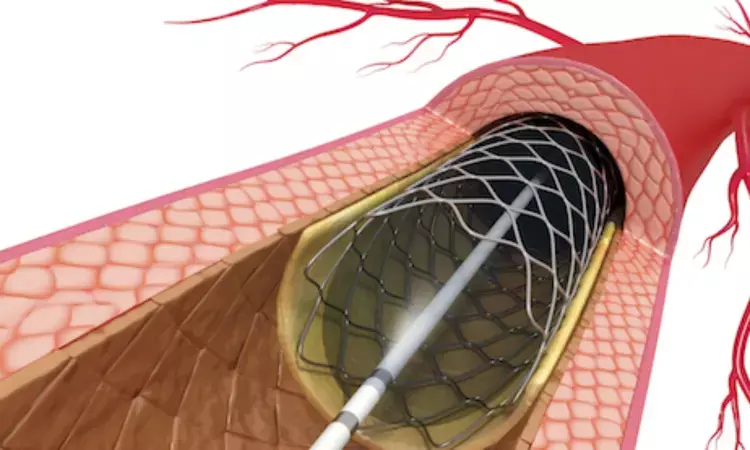- Home
- Medical news & Guidelines
- Anesthesiology
- Cardiology and CTVS
- Critical Care
- Dentistry
- Dermatology
- Diabetes and Endocrinology
- ENT
- Gastroenterology
- Medicine
- Nephrology
- Neurology
- Obstretics-Gynaecology
- Oncology
- Ophthalmology
- Orthopaedics
- Pediatrics-Neonatology
- Psychiatry
- Pulmonology
- Radiology
- Surgery
- Urology
- Laboratory Medicine
- Diet
- Nursing
- Paramedical
- Physiotherapy
- Health news
- Fact Check
- Bone Health Fact Check
- Brain Health Fact Check
- Cancer Related Fact Check
- Child Care Fact Check
- Dental and oral health fact check
- Diabetes and metabolic health fact check
- Diet and Nutrition Fact Check
- Eye and ENT Care Fact Check
- Fitness fact check
- Gut health fact check
- Heart health fact check
- Kidney health fact check
- Medical education fact check
- Men's health fact check
- Respiratory fact check
- Skin and hair care fact check
- Vaccine and Immunization fact check
- Women's health fact check
- AYUSH
- State News
- Andaman and Nicobar Islands
- Andhra Pradesh
- Arunachal Pradesh
- Assam
- Bihar
- Chandigarh
- Chattisgarh
- Dadra and Nagar Haveli
- Daman and Diu
- Delhi
- Goa
- Gujarat
- Haryana
- Himachal Pradesh
- Jammu & Kashmir
- Jharkhand
- Karnataka
- Kerala
- Ladakh
- Lakshadweep
- Madhya Pradesh
- Maharashtra
- Manipur
- Meghalaya
- Mizoram
- Nagaland
- Odisha
- Puducherry
- Punjab
- Rajasthan
- Sikkim
- Tamil Nadu
- Telangana
- Tripura
- Uttar Pradesh
- Uttrakhand
- West Bengal
- Medical Education
- Industry
Clopidogrel Better Than Aspirin for Long-Term Monotherapy After PCI, reports research

For prolonged antithrombotic treatment after percutaneous coronary intervention (PCI), clopidogrel monotherapy was more effective and at least as safe as aspirin monotherapy in a high-risk population, a Korean randomized trial showed.
The optimal strategy for long-term antiplatelet maintenance for patients who underwent percutaneous coronary intervention (PCI) remains uncertain. This study aimed to compare the efficacy and safety of clopidogrel versus aspirin monotherapy in patients who completed a standard duration of dual antiplatelet therapy (DAPT) following PCI with drug-eluting stents. In this multicentre, randomised, open-label trial, patients aged 19 years or older at high risk of recurrent ischaemic events (previous myocardial infarction at any time before enrolment, medication-treated diabetes, or complex coronary lesions) who completed a standard duration of DAPT after PCI were randomly assigned (1:1) to receive clopidogrel (75 mg once a day) or aspirin (100 mg once a day) oral monotherapy at 26 sites in South Korea.
The primary endpoint was the cumulative incidence of a composite of death from any cause, myocardial infarction, or stroke, assessed in the intention-to-treat population. Adverse events were captured as part of the secondary endpoints. It is closed to accrual and extended follow-up is ongoing. Findings: Between Aug 10, 2020, and July 31, 2023, 5542 patients were assessed for eligibility and 5506 were randomly assigned (2752 to clopidogrel monotherapy and 2754 to aspirin monotherapy).
The median time between PCI and randomisation was 17·5 months (IQR 12·6–36·1 months). During a median follow-up period of 2·3 years (IQR 1·6–3·0), the primary endpoint occurred in 92 patients in the clopidogrel group and 128 patients in the aspirin group (Kaplan–Meier estimated 3-year incidence 4·4% [95% CI 3·4–5·4] vs 6·6% [5·4–7·8]; hazard ratio 0·71 [95% CI 0·54–0·93]; p=0·013). Death from any cause occurred in 50 patients in the clopidogrel group and 70 in the aspirin group (2·4% [1·6–3·1] vs 4·0% [2·9–5·0] at 3 years; 0·71 [0·49–1·02]); myocardial infarction in 23 patients in the clopidogrel group and 42 in the aspirin group (1·0% [0·6–1·4] vs 2·2% [1·4–2·9] at 3 years; 0·54 [0·33–0·90]); and stroke in 23 in the clopidogrel group and 29 in the aspirin group (1·3% [0·7–2·0] vs 1·3% [0·8–1·7] at 3 years; 0·79 [0·46–1·36]).
There was no difference in the risk of bleeding between the clopidogrel and aspirin groups (3·0% [2·0–3·9] vs 3·0% [2·2–3·9] at 3 years; 0·97 [0·67–1·42]). Clopidogrel was not associated with a higher incidence of any adverse event compared with aspirin. Among patients who were at high risk of recurrent ischaemic events and who completed the standard duration of DAPT following PCI, clopidogrel monotherapy, compared with aspirin monotherapy, significantly reduced the cumulative incidence of a composite of death from any cause, myocardial infarction, and stroke, without an apparent increase in the risk of bleeding.
Reference:
Efficacy and safety of clopidogrel versus aspirin monotherapy in patients at high risk of subsequent cardiovascular event after percutaneous coronary intervention (SMART-CHOICE 3): a randomised, open-label, multicentre trial. Choi, Ki Hong et al. The Lancet, Volume 0, Issue 0
Dr. Shravani Dali has completed her BDS from Pravara institute of medical sciences, loni. Following which she extensively worked in the healthcare sector for 2+ years. She has been actively involved in writing blogs in field of health and wellness. Currently she is pursuing her Masters of public health-health administration from Tata institute of social sciences. She can be contacted at editorial@medicaldialogues.in.
Dr Kamal Kant Kohli-MBBS, DTCD- a chest specialist with more than 30 years of practice and a flair for writing clinical articles, Dr Kamal Kant Kohli joined Medical Dialogues as a Chief Editor of Medical News. Besides writing articles, as an editor, he proofreads and verifies all the medical content published on Medical Dialogues including those coming from journals, studies,medical conferences,guidelines etc. Email: drkohli@medicaldialogues.in. Contact no. 011-43720751


